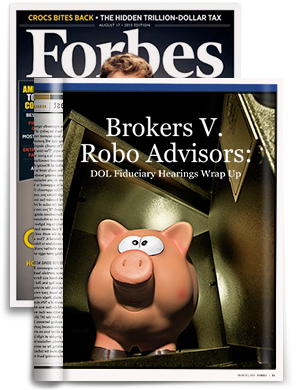Why Retirement Products Will Soon Be Sold Like Cars

WSJ’s MarketWatch interviews Mitch Tuchman regarding the U.S. Dept. of Labor’s new rules designed to make retirement investing safer for all Americans.
Regulations expected to take effect this year will add a new wrinkle to the old question of whether workers should keep their savings in their company 401(k) when they switch jobs or retire.
The U.S. Department of Labor’s so-called fiduciary proposal will require brokers to act in the best interest of retirement savers who are considering rolling 401(k) assets into an individual retirement account. Currently, brokers are held to a lesser standard that requires them to sell investments that are merely suitable for their client. “This is a historic, pro-consumer event,” said Mitch Tuchman, Managing Director of Rebalance, a firm that manages retirement investments, and a MarketWatch RetireMentor columnist.
The Office of Management and Budget is currently reviewing the proposals, which, pending a stamp of approval by that office, are expected to be published in their final form in the coming weeks. Generally, the regulations will then take effect eight months after publication, according to a Department of Labor filing in the Federal Register.
When they do, Tuchman said, investors who seek a broker’s recommendations on what to do with old 401(k) assets will be less vulnerable to poor-quality, conflicted advice. The fact that many investors have been ill served at this critical juncture could be seen as a reason to leave the 401(k) assets where they were.
Soon, Tuchman said, the sales of retirement products will become more like the sale of cars. A couple of decades ago, consumers had little way of knowing if they were being treated fairly at the auto dealership. These days, increased price transparency has boosted consumers’ bargaining power.
Meanwhile, prices for many investment products remain murky. When an investor seeks advice from a broker on what to do with 401(k) assets from a prior job, the broker may offer the investor an individual retirement account, annuity or another product. Since no money changes hands directly, the transaction may not feel like a sale, and the investor may not have had his guard up.
Although his business card might say “adviser,” a broker is also a salesman who is compensated by the financial services firm supplying the mutual funds or insurance products. Registered investment advisers, by contrast, are already held to a higher, fiduciary standard. Investors often have a hard time distinguishing between different kinds of investment professionals, which is another reason to hold them to similar standards of professional conduct, proponents of the Department of Labor regulations say.
Under the current standards, a broker is allowed to steer clients to an investment that pays him a fatter commission, even though it charges the clients higher operational expenses than other options.
These expenses eat into investment returns, but since they are withdrawn automatically from the account, their impact often remains invisible to the investor. By contrast, auto buyers generally know if someone’s trying to sell them a gas-guzzler, since mileage data is readily available and well understood.
About a third of Rebalance clients come from brokerages, where they had been paying as much as 2.5% annually in overall fees, Tuchman said. That’s $25 per $1,000 per year, so an investor with an account balance of $100,000 will lose $2,500 annually to fees. “The compounding of fees has a greater and greater impact, the longer you keep the assets,” said Fredrik Axsater, global head of defined contribution at State Street Global Advisors.
Under the new regulations, the broker would have to put the client’s interests first when giving retirement investment advice. While he can continue to receive commissions, he would need to disclose potential conflicts of interest. A written agreement would also provide the client information on fees and compensation and provide an illustration of investment returns.
To be sure, these new regulations won’t change the underlying considerations that investors will weigh when deciding what to do with an old 401(k), including whether they can improve on the investment selections and fees that the 401(k) offers.
But proponents say the regulations will raise the bar for retirement investment advice, paving the way for a more a secure future.






